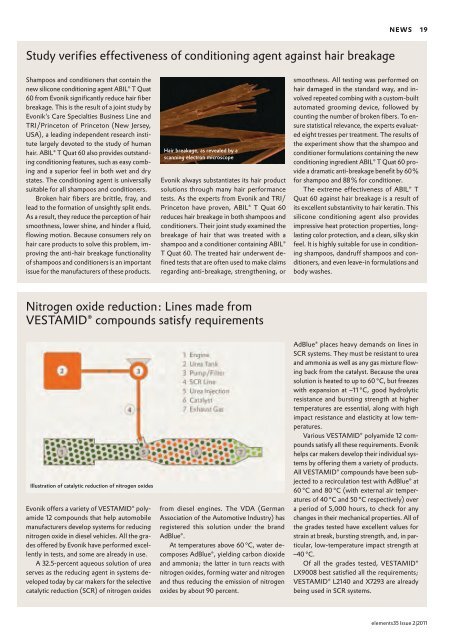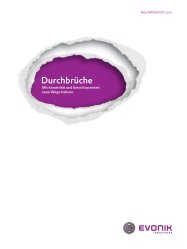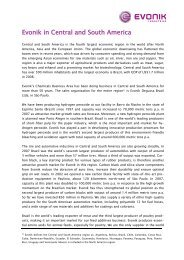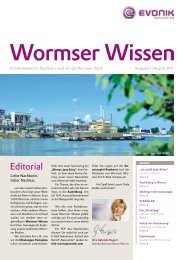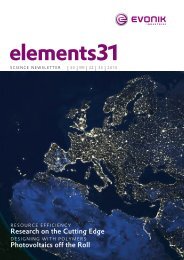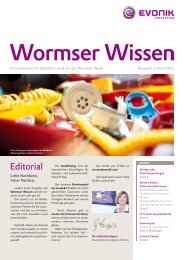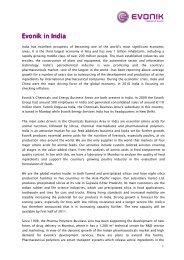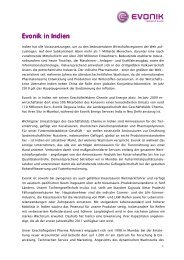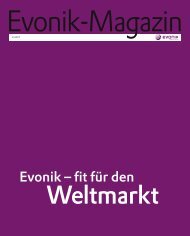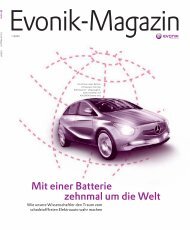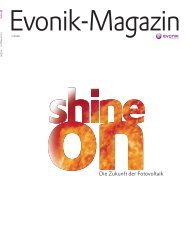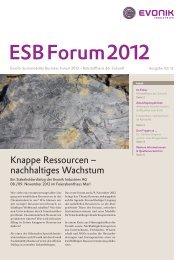Download - Evonik Industries
Download - Evonik Industries
Download - Evonik Industries
Create successful ePaper yourself
Turn your PDF publications into a flip-book with our unique Google optimized e-Paper software.
Study verifies effectiveness of conditioning agent against hair breakage<br />
Shampoos and conditioners that contain the<br />
new silicone conditioning agent ABIL® T Quat<br />
60 from <strong>Evonik</strong> significantly reduce hair fiber<br />
breakage. This is the result of a joint study by<br />
<strong>Evonik</strong>‘s Care Specialties Business Line and<br />
TRI/Princeton of Princeton (New Jersey,<br />
USA), a leading independent research institute<br />
largely devoted to the study of human<br />
hair. ABIL® T Quat 60 also provides outstanding<br />
conditioning features, such as easy combing<br />
and a superior feel in both wet and dry<br />
states. The conditioning agent is universally<br />
suitable for all shampoos and conditioners.<br />
Broken hair fibers are brittle, fray, and<br />
lead to the formation of unsightly split ends.<br />
As a result, they reduce the perception of hair<br />
smoothness, lower shine, and hinder a fluid,<br />
flowing motion. Because consumers rely on<br />
hair care products to solve this problem, improving<br />
the anti-hair breakage functionality<br />
of shampoos and conditioners is an important<br />
issue for the manufacturers of these products.<br />
<strong>Evonik</strong> always substantiates its hair prod uct<br />
solutions through many hair performance<br />
tests. As the experts from <strong>Evonik</strong> and TRI/<br />
Princeton have proven, ABIL® T Quat 60<br />
reduces hair breakage in both shampoos and<br />
conditioners. Their joint study examined the<br />
breakage of hair that was treated with a<br />
shampoo and a conditioner containing ABIL®<br />
T Quat 60. The treated hair underwent defined<br />
tests that are often used to make claims<br />
regarding anti-breakage, strengthening, or<br />
Nitrogen oxide reduction: Lines made from<br />
VESTAMID® compounds satisfy requirements<br />
Illustration of catalytic reduction of nitrogen oxides<br />
<strong>Evonik</strong> offers a variety of VESTAMID® polyamide<br />
12 compounds that help automobile<br />
manufacturers develop systems for reducing<br />
nitrogen oxide in diesel vehicles. All the grades<br />
offered by <strong>Evonik</strong> have performed excellently<br />
in tests, and some are already in use.<br />
A 32.5-percent aqueous solution of urea<br />
serves as the reducing agent in systems developed<br />
today by car makers for the selective<br />
catalytic reduction (SCR) of nitrogen oxides<br />
Hair breakage, as revealed by a<br />
scanning electron microscope<br />
from diesel engines. The VDA (German<br />
Association of the Automotive Industry) has<br />
registered this solution under the brand<br />
AdBlue®.<br />
At temperatures above 60 °C, water decomposes<br />
AdBlue®, yielding carbon diox ide<br />
and ammonia; the latter in turn reacts with<br />
nitrogen oxides, forming water and nitro gen<br />
and thus reducing the emission of nitrogen<br />
oxides by about 90 percent.<br />
neWs 19<br />
smoothness. All testing was performed on<br />
hair damaged in the standard way, and in -<br />
volved repeated combing with a custom-built<br />
automated grooming device, followed by<br />
counting the number of broken fibers. To ensure<br />
statistical relevance, the experts evaluated<br />
eight tresses per treatment. The results of<br />
the experiment show that the shampoo and<br />
conditioner formulations containing the new<br />
conditioning ingredient ABIL® T Quat 60 provide<br />
a dramatic anti-breakage benefit by 60%<br />
for shampoo and 88% for conditioner.<br />
The extreme effectiveness of ABIL® T<br />
Quat 60 against hair breakage is a result of<br />
its excellent substantivity to hair keratin. This<br />
silicone conditioning agent also provides<br />
impressive heat protection properties, longlasting<br />
color protection, and a clean, silky skin<br />
feel. It is highly suitable for use in conditioning<br />
shampoos, dandruff shampoos and conditioners,<br />
and even leave-in formulations and<br />
body washes.<br />
AdBlue® places heavy demands on lines in<br />
SCR systems. They must be resistant to urea<br />
and ammonia as well as any gas mixture flowing<br />
back from the catalyst. Because the urea<br />
solution is heated to up to 60 °C, but freezes<br />
with expansion at –11 °C, good hydrolytic<br />
resistance and bursting strength at higher<br />
temperatures are essential, along with high<br />
impact resistance and elasticity at low temper<br />
atures.<br />
Various VESTAMID® polyamide 12 compounds<br />
satisfy all these requirements. <strong>Evonik</strong><br />
helps car makers develop their individual systems<br />
by offering them a variety of products.<br />
All VESTAMID® compounds have been subjected<br />
to a recirculation test with AdBlue® at<br />
60 °C and 80 °C (with external air temperatures<br />
of 40 °C and 50 °C respectively) over<br />
a period of 5,000 hours, to check for any<br />
changes in their mechanical properties. All of<br />
the grades tested have excellent values for<br />
strain at break, bursting strength, and, in particular,<br />
low-temperature impact strength at<br />
–40 °C.<br />
Of all the grades tested, VESTAMID®<br />
LX9008 best satisfied all the requirements;<br />
VESTAMID® L2140 and X7293 are already<br />
being used in SCR systems.<br />
elements35 Issue 2|2011


